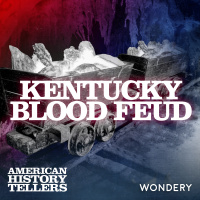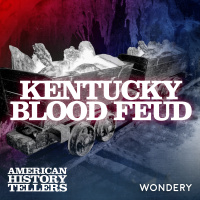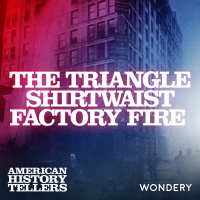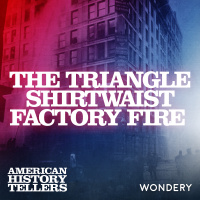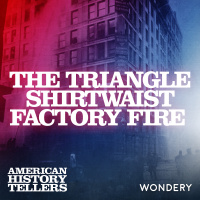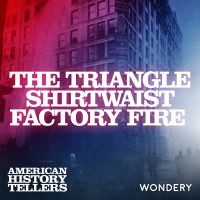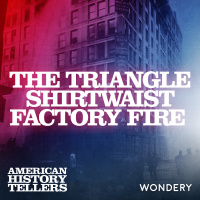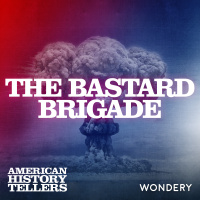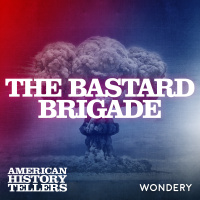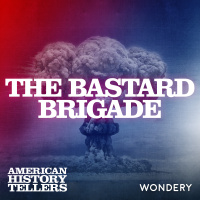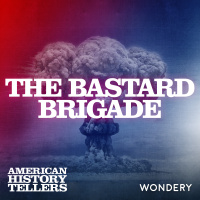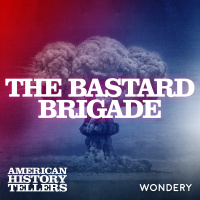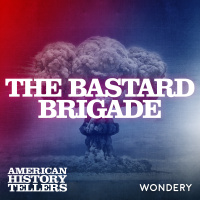Sinopsis
The words you speak. The ideas you share. The freedoms you defend. Every part of your life can be traced to our shared history, but how well do you really know the stories that made America? We’ll take you to the events, the times and the people that shaped our nation and Americans. And we’ll show you how our history affected them, their families and affects you today. Hosted by Lindsay Graham. From Wondery, the network behind Tides Of History, History Unplugged, Fall Of Rome and Dirty John.
Episodios
-
Kentucky Blood Feud - The Revenge of Bad Tom Baker | 2
18/12/2019 Duración: 37minThe Civil War forced the warring families of Clay County into an uneasy truce. The Garrards, Whites, Howards, and Bakers found themselves allied as they fought for the Union. But the war brought new challenges: the Northern army destroyed Clay County’s salt mines in order to keep them out of the hands of the South, and the Emancipation Proclamation brought an end to slavery, which had helped make salt mining so profitable.The Garrards and the Whites were so rich that they were able to withstand these pressures on their businesses. But the poorer Bakers and the Howards soon found themselves fighting over scraps of land and timber. And in 1898, a business dispute led “Bad Tom” Baker and “Big Jim” Howard to assassinate members of each other’s families, starting a wave of killings and arsons so bloody they would reshape the state.Support us by supporting our sponsors!See Privacy Policy at https://art19.com/privacy and California Privacy Notice at https://art19.com/privacy#do-not-sell-my-info.
-
Kentucky Blood Feud - The Murder of Daniel Bates | 1
11/12/2019 Duración: 34minThe longest and bloodiest feud in American history erupted in the 1840s in Clay County, Kentucky — where it raged for nearly a century and ultimately claimed more than 150 lives. The Clay County War, also known as the Baker-Howard Feud, pitted four families against each other: the powerful Garrads and Whites, who assembled vast wealth mining salt, and the less influential Bakers and Howards. In time, the Garrards would align with the Bakers, and the Whites with the Howards. At first, the families got along, cooperating in the back-breaking work involved with extracting salt in the Appalachian region. But as the economy collapsed and new technologies led to new competition from the outside, the families would find themselves increasingly competing for survival — and a single act of violence would be enough to spark a conflict that spanned generations. Support us by supporting our sponsors!See Privacy Policy at https://art19.com/privacy and California Privacy Notice at https://art19.com/privacy#do-not
-
The Legacy of The Triangle Fire | 5
20/11/2019 Duración: 39minIn September 2019 Democratic Senator and presidential candidate Elizabeth Warren invoked the memory of the Triangle Shirtwaist Factory Fire at a campaign rally just a few blocks from the site of fire in Manhattan. It was a powerful reminder of just how deep the legacy of the disaster runs. Organized labor and workplace safety have come a long way since the fire but after years of political opposition, unions and worker rights are on the decline. In the U.S., unions represent 6.4 percent of private-sector workers and just 10.5 percent of workers overall. That’s the lowest percentage in more than a century, and down from 35 percent in the 1950s. That's according to Steven Greenhouse, author of the new book Beaten Down, Worked Up: The Past, Present, and Future of American Labor. Greenhouse joins us to talk about the state of labor in America today and why after years of decline, labor is starting to gain steam.Support us by supporting our sponsors!See Privacy Policy at https://art19.com/privacy and California Pr
-
The Triangle Shirtwaist Factory Fire - In America They Don’t Let You Burn | 4
13/11/2019 Duración: 41minIn the wake of the biggest workplace catastrophe in the city of New York, the survivors of the Triangle fire and the families of the victims could only watch from the sidelines as the case against the Triangle bosses went to trial. The 146 deaths resulting from the fire had been sifted through the state’s legal machine and condensed into a single woman: a 24-year-old sewing machine operator named Margaret Schwartz. In December 1911, the general sessions court presided over by Judge Thomas Crain heard the People of New York vs. Max Blanck and Isaac Harris. The prosecution had a strong piece of physical evidence and a compelling witness. But Harris and Blanck had a lawyer whose courtroom rhetoric might get his clients off scot-free. If you enjoyed American History Tellers, be sure to check out Lindsay Graham’s other shows, American Scandal and American Elections: Wicked Game. Support us by supporting our sponsors!See Privacy Policy at https://art19.com/privacy and California Privacy Notice at htt
-
The Triangle Shirtwaist Factory Fire - Sixteen Minutes | 3
06/11/2019 Duración: 37minTwo years after the labor strikes that shook the city of New York, the workers of Triangle factory returned to better wages and lower hours. But when a fire broke out near closing time on a Saturday afternoon, these same workers found themselves swept up in a catastrophe. Some would escape, but many would not. In the weeks that followed, a city mourned and began to wrestle with questions of responsibility. Where did the blame for the tragedy lie? With the city? With the factory owners? Or with the workers themselves? Support us by supporting our sponsors!See Privacy Policy at https://art19.com/privacy and California Privacy Notice at https://art19.com/privacy#do-not-sell-my-info.
-
The Triangle Shirtwaist Factory Fire - Revolt of the Girls | 2
30/10/2019 Duración: 39minInspired by the labor strikes at Triangle and other factories in Lower Manhattan, more than 30,000 garment workers took to the streets of New York in protest in late 1909. For the first time, an industry of women sought not to just halt production at one factory — they wanted to put the brakes on an entire trade. With over four hundred garment factories shut down, factory owners banded together with police and the courts to fight the striking workers. But as the labor movement attracted new high-society allies, internal politics began to fracture the labor movement, threatening to derail the entire cause.Support us by supporting our sponsors!See Privacy Policy at https://art19.com/privacy and California Privacy Notice at https://art19.com/privacy#do-not-sell-my-info.
-
The Triangle Shirtwaist Factory Fire - Wildcat | 1
23/10/2019 Duración: 39minOn March 25, 1911, a fire broke out at the Triangle Shirtwaist Factory in Manhattan, claiming the lives of 146 garment workers — mostly women and girls. It was one of the deadliest workplace disasters in American history. Caused by a combination of carelessness and poor safety measures, the fire eventually set off a wave of workplace reforms that changed industry in America and sent New York party politics in a totally different direction.But in the years before the fire, the workers of the Triangle factory were focused on a different issue — advocating for higher pay. Facing long hours and unsympathetic bosses unwilling to implement change, the women decided they had only one option left. It was time to go on strike.Support us by supporting our sponsors!See Privacy Policy at https://art19.com/privacy and California Privacy Notice at https://art19.com/privacy#do-not-sell-my-info.
-
Dutch Manhattan - The Dutch Influence Today | 7
16/10/2019 Duración: 50minNew York City was founded on the Dutch principles of tolerance and capitalism, both of which were new ideas at the time. But much of the city's early history was lost until the 1970s, when a renewed interest in the Dutch period led to the founding of the New Netherland Center. Here, thousands of previously untranslated records shed new light on this crucial moment in Gotham’s history. Our guest today is Greg Young, who co-hosts the Bowery Boys, a popular podcast about all things New York City history. Young visited the New Netherland Center, and he joins us to share what he found there and where Dutch influence can still be seen in New York today.Support us by supporting our sponsors!See Privacy Policy at https://art19.com/privacy and California Privacy Notice at https://art19.com/privacy#do-not-sell-my-info.
-
Dutch Manhattan - New York | 6
09/10/2019 Duración: 37minIn the years after Adrian Van der Donck won a municipal charter for New Amsterdam, and under Peter Stuyvesant's stern but capable rule, the city flourished. Even English residents of New England and Virginia sent their goods to Europe via the future New York Harbor, because the Dutch were so good at the business of shipping. Dutch features that would become part of American culture — from cookies and cole slaw to Santa Claus — became ingrained. Most importantly, the Dutch notions of tolerance, which fostered a multi-ethnic society, and free trade, became rooted in Manhattan. But in London, King Charles II and his brother, James, the Duke of York, were eager to build an empire. Their plan involved taking over slaving posts in West Africa, reorganizing their American colonies, and taking the Dutch colony, with its strategically located capital. And soon, they would send a squadron of warships to Manhattan.Support us by supporting our sponsors!See Privacy Policy at https://art19.com/privacy and California P
-
Dutch Manhattan - The One-Legged Soldier | 5
02/10/2019 Duración: 36minPeter Stuyvesant was fresh from losing a leg in battle against the Spanish when he arrived in Manhattan in 1647. He was a tough soldier who was ready to take charge of the unruly population of New Amsterdam. He soon clashed with Adrian Van der Donck, the leader of the opposition, who was secretly crafting a formal legal complaint that would compel the Dutch government to give the colony a form of representative government. When Stuyvesant discovered that Van der Donck had been spearheading an effort to overthrow his rule, he had him arrested for treason. But after a public faceoff revealed the Dutch government had come down on the side of colonists, Van der Donck was released. He returned to Europe and traveled to The Hague, where he argued that the Dutch government should take over the colony from the West India Company. At first, the Dutch government supported Van der Donck’s cause. It granted New Amsterdam a charter, giving the colony official status as a Dutch city, and ordered Stuyvesant's recall. B
-
Dutch Manhattan - The Sheriff Comes to Town | 4
25/09/2019 Duración: 37minJust as it was becoming a New World success story, disaster came to New Amsterdam. Willem Kieft, the Dutch leader appointed by the West India Trading Company, declared war on local tribes, sending soldiers to slaughter them in their villages. The tribes responded with waves of death and destruction that would set the European settlers back decades in their development. A new colonist named Adriaen Van der Donck arrived to find the place in chaos. The colonists were furious at Kieft for endangering their settlement with his attacks. Van der Donck had been trained as a lawyer, and he soon found a role organizing the colonists against Kieft. He lobbied Kieft to permit the formation of a council to give the residents a say in their government. But when it became clear Kieft had no intention of giving the council any real power, Van der Donck responded by going over Kieft’s head and appealing directly to the leaders of the West India Company for intervention. The response wasn’t what he expected. It woul
-
Dutch Manhattan - Pirates and Prostitutes | 3
18/09/2019 Duración: 35minNew Amsterdam was a desperate place. For the first decade of its existence, the Dutch city on the tip of Manhattan Island served as a haven for pirates, prostitutes and smugglers. That was because the West India Company, which ran New Amsterdam, insisted on controlling all trade — something it simply couldn't manage effectively. Finally, in 1640, the Company gave up its monopoly, and what had been a rag-tag, Wild West kind of town quickly took on the hallmarks of Dutch capitalism. Trading firms in Amsterdam opened branch offices on Manhattan, and business boomed. Merchants traded in everything from furs to tobacco to Caribbean sugar and salt. Soon, Manhattan became a brash, free-wheeling pioneer settlement where visitors could hear some 18 different languages — at a time when the city’s population numbered only about 500. The ingredients were in place for an American success story utterly unlike the English colonies to the north. Support us by supporting our sponsors!See Privacy Policy at https://ar
-
Dutch Manhattan - Buying Manhattan | 2
11/09/2019 Duración: 35minTwelve years after Henry Hudson's 1609 trip charting the Hudson River, the Dutch used his voyage as the basis for a new colony, which would be wedged between the English colonies in New England and Virginia. New Netherland began with tiny numbers of people from different backgrounds. They settled the entire region that Hudson had traveled, from Delaware to New York to Connecticut. But being spread out so thinly exposed them to danger. In 1626, in the area around the future Albany, New York, a small party became embroiled in a fight between two native tribes, and some settlers were killed.In the aftermath, the colonists chose a new leader. Peter Minuit's first decision was to call all the settlers together for strength. Then he selected a location for a capital city, one that was strategically located in a world-class harbor and at the mouth of the colony's central river—a wilderness island called Manhattan. Support us by supporting our sponsors!See Privacy Policy at https://art19.com/privacy and Californ
-
Dutch Manhattan - Henry Hudson’s Big Mistake | 1
04/09/2019 Duración: 35minIn 1609, a headstrong English sea captain named Henry Hudson set out on behalf of the Dutch East India Company to find a trade route to Asia — and promptly found himself and his crew stranded in icy waters off the coast of Norway. As supplies dwindled, Hudson announced to his frostbitten crew that the ship would change course. They set off across the Atlantic Ocean in search of an alternative route through the North American continent.Hudson never found the Northwest Passage, but he did come across something else on that journey — a small island the native people called Manna-hatta. That settlement would eventually give rise to a new Dutch colony called New Netherland, with Manhattan Island, or New Amsterdam, as it would come to be known, as its capital. New Amsterdam would come to be defined by two key Dutch values: tolerance and capitalism. This series by Russell Shorto, based on his book The Island at the Center of the World, traces how Manhattan’s brief chapter as a Dutch colony shaped the city for centur
-
Remembering Emmett Till | 7
28/08/2019 Duración: 37minThe murder of Emmett Till galvanized the nascent civil rights movement. But the full story of what happened in Money, Miss., on August 28, 1955, is significantly different than the narrative that emerged at the time. A new app developed by scholars at Florida State University now seeks to give a fuller picture of Till’s lynching by taking users on a GPS guided tour around the Mississippi Delta and the important sites related to the case. Davis Houck, a professor of rhetorical studies at FSU, developed the app, and he joins us to talk about educating people on the legacy of Till’s killing and why it's more significant than ever.Support us by supporting our sponsors!See Privacy Policy at https://art19.com/privacy and California Privacy Notice at https://art19.com/privacy#do-not-sell-my-info.
-
The Bastard Brigade - Showdown in the Alps | 6
21/08/2019 Duración: 39minThe Alsos mission had a hard-charging leader in Boris Pash and an eccentric band of recruits. But if the so-called Bastard Brigade was going to track down the Nazi atomic bomb, they would also need scientific expertise. For that, they turned to the Dutch-American physicist Samuel Goudsmit. Goudsmit wasn’t the brigade’s first choice—far from it. He was considered weak and timid, and even Goudsmit himself worried he lacked the courage for the mission. But the scientist had been friends with Werner Heisenberg as a young man in Europe, and he felt personally betrayed by Heisenberg’s work for the Nazis. And as a Jew who’d lost his parents to the concentration camps, Goudsmit was determined to fight back against Hitler.But Goudsmit would eventually prove himself, and his brilliant detective work would lead the mission to a cave in Germany hewn into the side of a cliff — Heisenberg’s secret lair and the heart of the Nazi bomb project. Support us by supporting our sponsors!See Privacy Policy at https://art1
-
The Bastard Brigade - The Most Wanted Men | 5
14/08/2019 Duración: 39minAs the Nazis inched closer to acquiring a nuclear weapon, panic grew among the Allied forces. The Alsos Mission — otherwise known as the Bastard Brigade — was put in charge of gathering intelligence on Hitler’s bomb project, seizing stores of Nazi uranium, and hunting down members of the Uranium Club. The first atomic spy outfit in history was underway. Their mission was led by the American-born son of a Russian Orthodox bishop, Colonel Boris Pash — a high school teacher, irreverent prankster, and veteran of two wars by his 18th birthday. Pash’s team would pursue leads across Europe, taking them on a dangerous journey from an Antwerp zoo to a French laboratory beset by snipers.Support us by supporting our sponsors!See Privacy Policy at https://art19.com/privacy and California Privacy Notice at https://art19.com/privacy#do-not-sell-my-info.
-
The Bastard Brigade - The Strangest Man | 4
07/08/2019 Duración: 39minBy mid-1944, the Allies’ fight to track down and stop the Nazi atomic program had met with failure and disappointment. And so the Manhattan Project took a new tack by recruiting and developing atomic spies — including a backup catcher for the Boston Red Sox named Moe Berg. Although little known today, Berg was one of the most famous athletes of his day, and a certified genius. He could charm sports writers and fans alike with his tales of palling around with Babe Ruth and other celebrities, but he also held degrees from Princeton, Columbia, and the Sorbonne and spoke a dozen languages. When World War II broke out, Berg volunteered to work on behalf of the Office of Strategic Services as a spy. Over time, however, Berg’s focus would shift from espionage toward assassination. Soon, he would travel abroad to target the most feared scientist in the world and the sharpest mind in the Nazi Uranium Club: German physicist Werner Heisenberg. Support us by supporting our sponsors!See Privacy Policy at ht
-
The Bastard Brigade - The Kennedy Curse | 3
31/07/2019 Duración: 34minIn early 1944, the Allies developed a desperate plan to destroy several massive bunkers in Nazi-controlled France—bunkers that reportedly housed atomic missiles. The plan called for filling up airplanes with napalm, flying them over to France via remote control, and ramming them into the bunkers, blowing them sky-high. But the military still needed pilots to get the napalm-filled planes off the ground and pointed in the right direction.It was dangerous in the extreme. But one of the first volunteers for the mission was none other than Joe Kennedy, the daring older brother of future president John F. Kennedy. John had recently become a war hero, and a ragingly jealous Joe was willing to risk everything to destroy Hitler’s bunkers—and, more importantly, turn the spotlight back on himself.Support us by supporting our sponsors!See Privacy Policy at https://art19.com/privacy and California Privacy Notice at https://art19.com/privacy#do-not-sell-my-info.
-
The Bastard Brigade - The Juice | 2
24/07/2019 Duración: 39minThe discovery of uranium fission in Nazi Germany in 1938 terrified Allied nuclear scientists—especially since the Nazi atomic bomb project, the dreaded Uranium Club, had a two-year head start on the Manhattan Project.So the Allies decided to strike back. They couldn’t prevent Germany from acquiring uranium, but they could disrupt access to another key ingredient in atomic research—heavy water. Only one company in the world produced heavy water at the time, an isolated plant in Norway, so the Allies decided to send in teams of elite commandos on a top-secret mission to destroy it.These missions certainly didn’t go perfectly—some were in fact disasters. But to prevent Hitler from getting an atomic bomb, no price was too high to pay.Support us by supporting our sponsors!See Privacy Policy at https://art19.com/privacy and California Privacy Notice at https://art19.com/privacy#do-not-sell-my-info.

